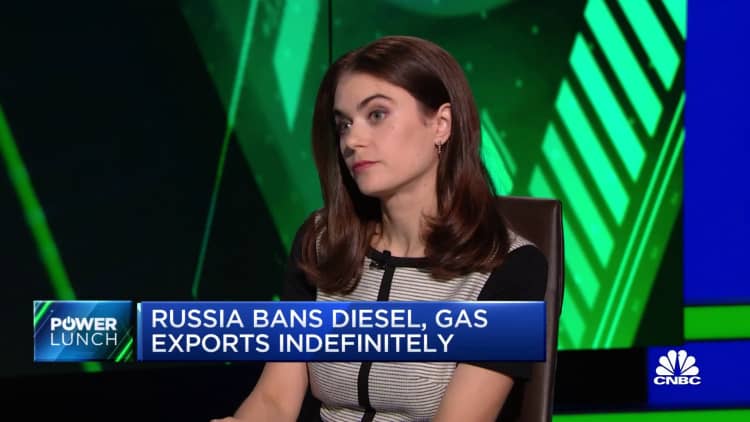Russia’s indefinite ban on fuel exports could worsen a global
From February 5, 2023, the European Union will no longer purchase petroleum products such as diesel, gasoline or lubricants from Russia.
Picture Alliance | Picture Alliance | Getty Images
Russia imposed an indefinite ban on the export of diesel and gasoline to most countries, a move that risks disrupting fuel supplies ahead of winter and threatens to exacerbate global shortages.
In a government decree signed by Prime Minister Mikhail Mishustin, the Kremlin said Thursday that it would introduce “temporary” restrictions on diesel exports to stabilize fuel prices on the domestic market.
The ban, which came into immediate effect and applies to all countries apart from four former Soviet states, does not have an end date. The countries exempt from the ban include Belarus, Kazakhstan, Armenia and Kyrgyzstan, all of which are members of the Moscow-led Eurasian Economic Union.
Russia is one of the world’s largest suppliers of diesel and a major exporter of crude oil. Market participants are concerned about the potential impact of Russia’s ban, particularly at a time when global diesel inventories are already at low levels. Oil prices jumped as much as $1 a barrel on the news on Thursday, before settling lower for the session.
International benchmark Brent crude futures traded 0.9% higher at $94.13 a barrel on Friday afternoon in London, while U.S. West Texas Intermediate futures rose 1.1% to trade at $90.62.
Energy analysts said the vague language used in Russia’s announcement made it difficult to assess exactly how long the ban would remain in place and warned that Moscow could once again be seeking to weaponize fuel supplies ahead of another winter heating season.
A spokesperson for the Kremlin said Friday that the fuel export ban would last for as long as necessary to ensure market stability, Reuters reported.

In the weeks leading up to Thursday’s intervention, analysts said Russian diesel exports had come under pressure due to the weakness of the ruble, domestic refinery maintenance and government-led efforts to increase domestic supply.
“All deals agreed before the regulation took effect are still on, meaning the likelihood of an immediate halt in diesel and gasoline exports is unlikely, most probably it would take 1-2 weeks for the impact to transpire,” Viktor Katona, lead analyst at Kpler, said in a research note published Friday.
“By that point, however, the government might already annul this specific piece of legislation, as abruptly as it was published,” he added.
What impact could the ban have?
Prior to the Kremlin’s full-scale invasion of Ukraine in February last year, Russian refineries exported an estimated 2.8 million barrels per day of oil products. That figure has since fallen to around 1 million barrels per day, according to ING, but Moscow still remains a major player in global energy markets.
Warren Patterson, head of commodities strategy at ING, said in a research note published Friday that Russia’s ban on fuel exports was a major…
Read More: Russia’s indefinite ban on fuel exports could worsen a global
